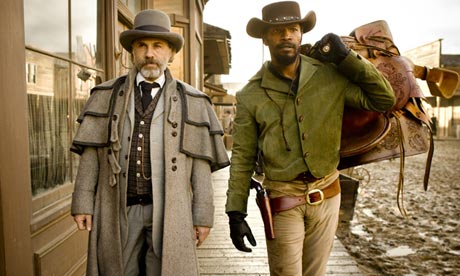Do we ever need a caveat emptor for a Bond film’s mean-spirited sexism? Mais non, fans of the latest cry, it’s just a bloody Bond film! And so it is, meeting its duties with the canny panache of a first-rate ad agency. The timeworn brand iconography is present and accounted for: the man, the music, the martini; exotic locales, improbable stunts, nefarious villainy. But of course they are. What really gives 007’s 23rd (in year 50) the market advantage is director Sam Mendes’ art film polish. Or rather, cinematographer Roger Deakin’s, a Coen brothers favorite: from a birds-eye-view of a train in Turkey to the depths of a frozen lake in Scotland, this is one good-looking movie, owing no small due to the countless, nameless set designers, costumers and lighting technicians at hand (although the shadowcast fisticuffs in Shanghai I’m willing to credit entirely to the cameraman’s genius). It is also about as middlebrow as they come, which is to say, as lower-middle aspiring to high. Consider how M reads Tennyson during a cross-cut crosstown chase. Or how megalomaniac Silva’s interrogation room shamelessly apes Hannibal Lecter’s. Or how Silva, Bond, and M are triangulated into a Freudian standoff for Mommy’s love. (Is it an accident that when pronouncing M’s name, Bond stretches it to sound like ‘mum’? You tell me.) Openly gay screenwriter John Logan has curried much favor for writing Silva as a complex gay villain, meaning that a preening homo scarred by maternal neglect is ‘complex’; who knew?
This
is not to say Skyfall isn’t all
admirably well-played, -written, -delivered, and so on and so forth: it’s as
tailored to prevalent concepts of quality as Tom Ford’s suit is to Daniel
Craig’s sinewy body. But what are we
supposed to do with the fate of Berenice Marlohe’s bodacious Severine, righteously
called out by London Times critic Giles Coren in a banned editorial? Her cavalier treatment would cast a pall over any film,
but in the context of a PG-13 prestige blockbuster peddling a nostalgia that
culminates in men’s restoration to their rightful sovereignty – Ralph Fiennes
takes Dame Judi Dench’s place when M expires; Naomi Harris’s Moneypenny relinquishes
her rifle and happily takes a desk job after Bond suggests “field work isn’t
for everyone” – Severine’s victimization is the nasty apex of a thoroughly
reactionary two-and-a-half hours at the movies.
What seems cause for concern, I think, is how little concern this has caused. Many hands have wrung this week in the wake of Seth MacFarlane’s boorish hatchet job hosting the Oscars, and rightly so, but a curious blind spot persists in the riled blogosphere, epitomized by the New Yorker’s Amy Davidson: “it’s notable that two of the better moments in the show involved Bond films.” It is notable. Davidson refers to Shirley Bassey’s performance of “Goldfinger” and Adele’s of “Skyfall,” which partitioned a midshow retrospective of the Bond franchise, and she’s right: here are instances of abundant dignity for women onstage, neither of them conforming to the standards of beauty snidely upheld by the host, the red carpet, and the culture industry writ large. But how do we cope with this dignity’s enlistment in honoring cinema’s most evergreen icon of alpha masculinity?
What seems cause for concern, I think, is how little concern this has caused. Many hands have wrung this week in the wake of Seth MacFarlane’s boorish hatchet job hosting the Oscars, and rightly so, but a curious blind spot persists in the riled blogosphere, epitomized by the New Yorker’s Amy Davidson: “it’s notable that two of the better moments in the show involved Bond films.” It is notable. Davidson refers to Shirley Bassey’s performance of “Goldfinger” and Adele’s of “Skyfall,” which partitioned a midshow retrospective of the Bond franchise, and she’s right: here are instances of abundant dignity for women onstage, neither of them conforming to the standards of beauty snidely upheld by the host, the red carpet, and the culture industry writ large. But how do we cope with this dignity’s enlistment in honoring cinema’s most evergreen icon of alpha masculinity?
We
don’t, fans of the series reply, it’s just a bloody fantasy. And so it is, but that fantasy doesn’t
consist only in Bond’s amply bestrewn gentility. It consists also in the social relations that
gentility preserves. There’s the
Eurocentrism, of course, and there’s the upper-snuff pedigree; he never reads but we must assume he's an Oxonian. And then there’s the sexism. The Bond girls - all fully grown women, I seem to recall - and their habitual
undress; his burning through them; his occasional corporal discipline when they
get out of line. The slapping has
generally ceased by now, but Bond’s rough way with Séverine in Skyfall is one (uncomfortable) nod to Bond’s legacy (From Russia With Love in particular, winked at also by that aforementioned Turkish train) in a film that boasts many. I would buy the disavowal - that we know it's all imaginary, thank you very much - if the legions who saw it seemed to value some kind of critical distance, but
that’s clearly not the case. On the
contrary, the positive critical consensus has overwhelmingly valued the poetic realism, the
unmannered acting, and the thematic nuance of Mendes’ film: in short, the capacity
to get swept up in it in spite of it all. (I am not innocent of this: although I resisted Skyfall, I remain a fan of Casino Royale, the first Bond with Craig - playing a much more sympathetic 007, I might add.) It's the
magic of the movies, if you will.
Precisely the mass-market enchantment the Oscars exist to legitimate. Precisely the enchantment from which we must waylay the world’s MacFarlanes with severe prejudice. But the only way the two ultimately differ, in the near-infinite access their antediluvian worldviews have to us - the one in PG-13 wide release, the other in primetime broadcast - is that we take pleasure in one, and most certainly not the other.






